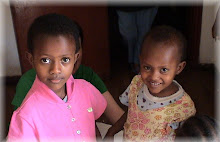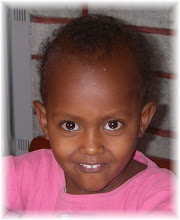There has been much speculation on the two Canadian Ethiopia Adoption yahoo groups regarding what the upcoming Bill C-14 might mean to prospective adoptive families. In the beginning, most were hopeful that it would eliminate the long (often up to 6 months) wait that families and children in orphanages are subjected to, while waiting for the Permanent Resident Visa to be issued.
This is really unfair, unnecessary, and so hard on the children. These children, the majority of whom, have not been in the orphanage more than a few days, before they are proposed to waiting families, are then made to wait this additional 6 months. Who wants to see a child sitting in an institution?
Thankfully, our agency has a wonderful Transition House, where the children are loved and well fed and cared for, but that does not take away from the fact that these children are needing to be in a permanent placement as quickly as possible. Sitting in this orphanage for an addition 5-6 months will cause the children to go through yet another loss, when they are forced to leave the caregivers that they have now become attached to. Other countries: US, Great Britain, Australia, to name a few are bringing their children home in 4-6 weeks after the court date!
But now we have heard news from the Canada Gazette that Bill C-14 WILL NOT bring our kids home sooner. They expect the new regulations to take just as long as the Permanent Resident Visas. This is extremely disheartening news to anyone involved in an adoption.
Two wonderful ladies within our Yahoo groups, who have an outstanding amount of professional clout, education and a great deal of care, have worked extraordinarly hard, night and day, researching thoroughly and then drafting up, an articulate and well versed letter. This position letter will be sent to the Director of the Legislation and Program Policy Citizenship and Immigration.
Following this letter (down below) there is a "support letter". If you do support this position taken in the position letter, please send your personalized letter of support to Chris Arden (at christycanuck @yahoo.ca – remove spaces) NO LATER THAN 13 NOVEMBER 2007. They will collect all the support letters and include them in a package with the position letter to be sent to the Director at Citizenship andImmigration who is responsible for collecting responses to the regulations. All responses need to reach him by 15 November 2007.
There is an opening here where changes are still being implemented - specifically where it relates to the time frame in bringing the children home sooner. If you are a friend, or a family member, or an aunt, uncle, cousin, of an adoptive or prospective adoptive family PLEASE consider supporting us all in this endeavor. This is your chance to help change the course of how International Adoptions are done in Canada, and help bring children out of institional care and into their forever families *sooner*. Thank you!!!
It is a long letter, but I can only assume that if you read this blog regularly it is because you care about someone who is adopting. This will impact all of our lives. PLEASE read the letter in its entirety and then the "support" letter which follows it.
The support letter is the one that can be cut and pasted into your own email and forwarded with your own particulars to personalize it to christycanuck @yahoo.ca
Thank you, Justine
~~~~~~~~~~~~~~~~~~~~~~~~~~~~~~~~~~~~~~~~~~~~~~~
In June 2007, Bill C-14 "An Act to Amend the Citizenship Act(Adoption)" was passed by both Houses of Parliament and received RoyalAssent. This Bill did away with the need for internationally adopted children to apply for permanent resident status to come to Canada and instead spelled out that they could receive Canadian citizenship if certain conditions (relating to the best interests of the child, the fulfilment of legal requirements, and it being a bona fide adoption)were met.
For the past four and a half months. the adoption world has been anxiously awaiting the publication of the regulations spelling out how the new procedures would work. A draft of these new regulations was finally made public in the Canada Gazette of November 3, 2007, and interested parties invited to comment on them.
Families who are adopting from Ethiopia have taken the initiative toprepare a response to the regulations. While we are supportive of theBill, and while the procedure and supporting documentation requiredfor this new process appear relatively straightforward, we nevertheless have concerns relating to how long it takes to bring our children home.
The introduction to the proposed new regulations states that "It is anticipated that the applications for citizenship will be completed in a similar time frame as the immigration permanent residentapplications" and again "As this is a new service line for citizenship, service standards are currently under development." These statements are of little comfort, given that the service standard for permanent resident visa applications is for a decision to be made within six months, and that the people processing Ethiopian adoption permanent resident applications are currently taking close to the fulltime to issue visas. We believe that it is in the best interests of our children to remove them from an institutional setting and bring them home as quickly as possible. It is in the Canadian government's power to do so; they merely need to establish a specific servicestandard for processing the new citizenship applications and ensure that they meet the standard.
We have, therefore, prepared a position letter outlining our concerns and the rationale behind them. The position letter is presented below. It is followed by a "support letter." If you do indeed support the position taken in the position letter, we ask you to send your personalized letter of support to Chris Ardern (at christycanuck @yahoo.ca – remove spaces) NO LATER THAN 13 NOVEMBER 2007. We will collect all the support letters and include them in a package with the position letter to be sent to the Director at Citizenship and Immigration who is responsible for collecting responses to theregulations. All responses need to reach him by 15 November 2007.
Position Letter9 November 2007
Mark Davidson
Director, Legislation and Program Policy
Citizenship BranchCitizenship and Immigration Canada
Re: Canada Gazette, Part 1, Vol.141, No. 44 – November 3, 2007.
Dear Mr. Davidson,We are writing to you as adoptive parents concerned with how the newRegulations Amending the Citizenship Regulations, 1993, may play out.
We are aware that the intent of Bill C-14: An Act to Amend theCitizenship Act (Adoption) was to address the differential treatmentbetween children born abroad to Canadian citizens and those adopted abroad in regards to acquisition of Canadian citizenship. In particular, some children adopted abroad by Canadian parents havenever been able to obtain Canadian citizenship as they always resided abroad and never became permanent residents. The Federal Court judgedthis differential treatment to violate section 15 of the Canadian Charter of Rights and Freedoms.
Bill C-14 removes the requirement for permanent resident status beforeapplying for Canadian citizenship. In so doing, the Bill and the new regulations have implications for all children adopted abroad by Canadian citizens, including those who will immediately be brought toCanada by their adoptive parents, which constitute the majority of international adoptions.
We strongly support the amendment of the Citizenship Act to make it easier and faster for children adopted abroad to receive Canadian citizenship. Similarly, the new regulations governing the citizenship application process appear to be well-grounded and straightforward.
Our concerns centre around the statement contained in the RegulatoryImpact Analysis that "applications for citizenship will be completed in a similar time frame as the permanent resident applications." The reasons for our concern are the following:
• we wish to ensure that our children spend as little time ininstitutional care as possible;
• the permanent resident processing timelines for adopted children(and, therefore, the new citizenship application processing timelines)can be quite lengthy and vary significantly depending on the country from which the child is being adopted; and
• Canada's timelines for bringing our children home appear to besignificantly longer and much more variable than timelines of othercountries.
The Regulatory Impact Analysis notes further that
"service standards are currently under development." We strongly recommend that servicestandards be set to a maximum of four weeks for processing Bill C-14 citizenship applications. This would eliminate the vastly different timelines between source countries and enable all adoptive parents to bring our children home as quickly as possible.
Minimizing the time our children spend in institutional careIt is in the best interests of our children to spend as little time aspossible in institutional care.
The International Adoption Medicine Program at the University ofMinnesota Children's Hospital has conducted extensive research on the effects of institutional care on the development and growth ofinternationally adopted children. Many findings point to extended institutional care being detrimental to the physical growth and cognitive development of children. For example:
• Institutionalized children's growth rates fall one month of linear growth behind for every 3-4 months spent in an orphanage, regardlessof the country of origin.
• It is common for even very young institutionalized children to experience sleep issues (such as the fear of sleeping alone or ofabandonment while asleep) or food issues (such as gorging or hoarding).
• Expressive language is always behind in institutionalized children,even those as young as 18 months.
• Some institutionalized children experience sensory integrationdifficulties.
This does not mean that internationally adopted children fare less well than children born to Canadians. It does mean that they face different, and in many cases more, challenges. With proper care,attention, and time, these challenges can be overcome. The vast majority of children adopted internationally from institutional settings make significant growth and developmental gains during the first years of life in their adoptive families, quickly catching up with their never-institutionalized peers.
Despite this, the University of Minnesota's research shows that, threeyears after joining their families, 30% of internationally adoptedchildren who spent eight months or more in institutional care sufferfrom lingering developmental or behavioural issues. Thus, evenrelatively short periods of institutional care during a child'scritical early years can have long-term effects that take much longerto overcome than the actual amount of time spent in care.
Length and variability of permanent resident (and by extensioncitizenship) processing timelinesThe length of time a child spends in institutional care prior to being adopted is outside the control of the Canadian government. However, the length of time it takes to bring that child home once the adoption has been finalized is a factor over which the Canadian government has almost complete control.
In light of the research findings noted above, it behoves the Canadian government to do everything in its power to ensure that internationally adopted children spend the least amount of time in institutional care as humanly possible. The service standard for processing permanent resident visa applications is that a decision is made within six months. The actualprocessing timelines vary considerably. No doubt owing to the volumeof adoptions from China , these children obtain their permanentresident visa within four days of the application being submitted.Children adopted from other countries are not as fortunate. Thosecoming from Ethiopia, for example, are being made to wait as long asfive months from the time the application is submitted – despite thefact that adopted children's visas applications are supposed to begiven priority.
With the change to a citizenship-based homecoming process, there will also be the need to apply for a Canadian passport for our children, adding about another week to the timeline.
By maintaining a six-month standard for granting citizenship to children adopted abroad, the Canadian government contributes directly and significantly to the cognitive and developmental delays and challenges that many internationally adopted children face. As adoptions from China continue to decline and adoptions from other countries increase, more and more internationally adopted children will be affected by the longer timelines and inconsistent practices of Canadian government procedures, and more and more of them may face increased developmental challenges owing to factors entirely within the Canadian government's control.
If the Canadian government is indeed concerned with acting in the best interests of our children, it must develop service standards and processing timelines that result in a much faster union between children and their new families, thus minimizing the effects ofinstitutionalization.
The most important thing for parents of internationally adopted children is to bring our children home as quickly as possible. We wantto hold them in our arms and have the often years-long "gestation"come to an end. Faster citizenship means little to adoptive parents ifit is not accompanied by a fast and efficient means for bringing ourchildren home.
Canadian homecoming timelines are longer and more variable than those of other countries
Our research indicates that adoptive parents in other countries can bring their children home much more quickly than many Canadian parentscan. While there are differences in the way the destination country treats various source countries, these differences appear to be matters of policy and regulation (such as different treatment of Hague signatory countries versus non-Hague signatory countries), rather than differences based on inconsistent service standards.
The United States imposes certain conditions upon the immigration and citizenship of internationally adopted children. These conditions are screened through an interview with a US consular official in thechild's country of birth, generally within a few weeks of the adoption's being finalized, following which a visa to enter the US is granted immediately. Citizenship is granted either upon the child'sentry to the US or upon re-adoption in the US, depending on the typeof immigrant visa issued and the requirements of the parents' state of residence. It appears that the immigration process can generally be completed within 4-6 weeks of the adoption being finalized or the parent gaining legal custody of the child abroad.
The United Kingdom allows internationally adopted children to enter the UK on an adoption visa, which can apparently be obtained at British embassies within three working days. The visa is granted basedon the foreign adoption documentation, occasionally supplemented by an interview with the adoptive parents. Thus, it appears that internationally adopted children are able to join their families inthe UK very quickly after the foreign adoption order is issued.
Internationally adopted children enter Australia on an adoption immigrant visa. Adoptions from Hague signatory countries are recognized as final based on the foreign adoption order; otherwise the adoption must be finalized in Australia. In the former case, the child must apply for citizenship either from abroad or in Australia. In the latter case, the child becomes a citizen automatically upon the adoption's being finalized and need only apply for proof of citizenship. Adoptive parents in Australia inform us that the immigration process is usually completed within 4-8 weeks of theadoption being finalized, at least for adoptions from Ethiopia.
Adoptive parents from Finland and Spain have informed us that, for adoptions from Ethiopia, their children's immigrant visas can be processed within a month of the adoption being finalized in the Ethiopian courts.
Specific service standards or alternate proceduresTo enable the speedy union of adopted children with their parents, andto minimize the effects of institutional care, we urge you toestablish specific service standards for Bill C-14 citizenshipapplications, and that these be processed in a maximum of four weeksregardless of the child's country of origin.
Since the vast majority of internationally adopted children are under five years of age, there can be little question that they will be granted citizenship. The sole reason for the continued differential treatment of adopted versus birth children (in requiring them to applyfor citizenship rather than being given automatic citizenship) is to ensure that it is a bona fide adoption and in the best interests ofthe child. As a country that has ratified the Hague Convention on Intercountry Adoption, Canada (via the provinces) has implemented strict regulations governing international adoptions by Canadians which ensure that these criteria have been met. The provincial approvals that authorize parents to adopt a child internationally are the very documents that parents will be required to submit with the citizenship application, along with the foreign adoption orders, to substantiate fulfillment of the requirements under section 5.1(1) or5.1(3) of the Citizenship Act.
Therefore, it should be virtually a given that the submission of these documents equates with fulfillment of the conditions. It should thus be neither onerous nor time-consuming to review the documentation and make a decision with regards to citizenship for these children.
We would go so far as to suggest that internationally adopted children should be able to receive a temporary Canadian passport that would enable them to enter Canada even before the citizenship decision hasbeen made. However, that would require changes to the Order Respecting Canadian Passports, and as such is beyond the scope of Bill C-14 and the new regulations.
Thank you very much for considering our perspectives as adoptive and prospective adoptive parents. We would be happy to discuss our views and concerns with you at your convenience.
Sincerely,
Roma Quapp
(Adoptive mother to a daughter from China and a son fromEthiopia, the latter of whom is still waiting for a permanent residentvisa to be issued four months after his adoption was finalized)
and
Christine Johnstone Ardern
(Prospective adoptive mother of a daughterfrom Ethiopia, waiting for the adoption to be finalized)
~~~~~~~~~~~~~~~~~~~~~~~~~~~~~~~~~~~~~~~~~~~~~
Support LetterIf you support the above position letter and wish to include a letterof support in the package we are preparing for Mr. Davidson, please cut and paste the text below into a clean e-mail, PERSONALIZE it with your details (if you desire, otherwise remove the all-caps text relating to personalization), include your full NAME and ADDRESS at the bottom, and send it to christycanuck @ yahoo.ca (remove spaces) NO LATER THAN 13 NOVEMBER 2007.
Mark Davidson
Director, Legislation and Program Policy
Citizenship Branch
Citizenship and Immigration Canada
Dear Mr. Davidson,
PERSONALIZE LETTER BY STATING YOUR SITUATION: (PROSPECTIVE) ADOPTIVEPARENT, NUMBER OF CHILDREN, LENGTH OF TIME FOR VISA TO BE ISSUED,ETC.; OR OTHER RELATIVE OR FRIEND,I fully support the position laid out by Roma Quapp and Chris Johnstone Ardern regarding the need for set specific service standards for Bill C-14 citizenship applications to be processed within a maximum of four weeks. This would ensure a speedy union between children adopted abroad and their families in Canada and minimize the time they spend in institutional care.
Making it easier and faster for children adopted abroad to receive Canadian citizenship is a good thing. But faster citizenship means little if it is not also accompanied by a fast and efficient processfor bringing our children home.
Up to a third of internationally adopted children who spent eight months or more in institutional care suffer from lingering developmental issues three years after joining their families. The Canadian government's current processing standards contribute directly and significantly to this problem by causing many adopted children to stay institutionalized far longer than necessary. Failing to improve these standards by reducing timelines will mean the Canadian government is failing our internationally adopted children. The Canadian government should work for the best interests of these children by ensuring that they need wait no longer than a month before being allowed to join their new families.
Sincerely,
NAME
ADDRESS






















